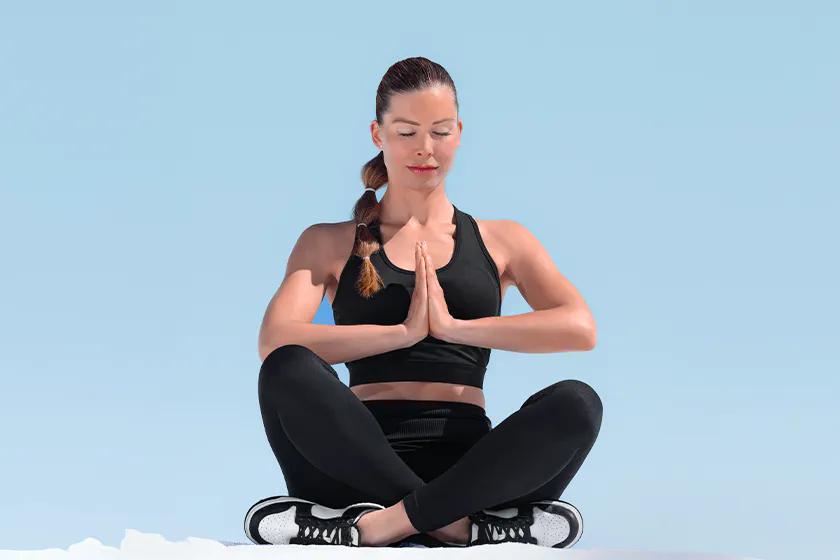Managing Stress with Simple Mindfulness Techniques

Stress is inevitable in most people’s lives, especially in today’s fast-paced world. It’s hard to think of anything that isn’t a potential source of stress. Whether it’s relationship challenges, financial pressures, work deadlines, or the constant technological buzz, stress is waiting around every corner.
Truth be told, stress is not necessarily a bad thing. A small amount here and there can be motivating. Chronic stress, however, that’s a different story. It takes a toll on mental and physical health. Fortunately, there are powerful tools to manage stress and promote overall well-being. Mindfulness is one such tool.
This article explores how mindfulness can help you manage stress, improve your fitness journey, and help you lead a more balanced life.
What is mindfulness?
Mindfulness is the ability to be fully present in the moment. It means being aware of your thoughts, feelings, bodily sensations, and the environment without judgment (in an accepting way). When you are fully immersed in the moment, there is no time or space to think about the past or worry about the future. That is the driving force behind mindfulness.
Mindfulness is not a religious concept. Although we can trace its roots back to the teachings of Buddhism, nowadays it is a secular concept adopted and widely used in psychology, fitness, and healthcare. There is scientific evidence that mindfulness can improve focus, enhance emotional regulation, reduce stress, and boost physical health.
What is the connection between stress and fitness?
Stress and fitness are deeply interconnected. As a reaction to stress, your body releases cortisol, a hormone that can lead to weight gain, muscle breakdown, and fatigue. Chronic stress can also disrupt sleep, reduce motivation to exercise, and increase cravings for unhealthy foods.
Contrary to this, regular physical activity is one of the most effective ways to combat stress. Exercise releases endorphins, the body’s natural mood elevators, and helps regulate cortisol levels.
However, when stress is not managed, it can create a vicious cycle. This is how it looks like:
Stress leads to poor fitness habits. → Poor fitness habits exacerbate stress.
That’s where mindfulness comes in. By incorporating mindfulness into your fitness routine and daily life, you can break this cycle and create a healthier, more balanced lifestyle.
How does mindfulness help to reduce stress?
Mindfulness helps manage stress in several ways. Here’s what it does:
- Breaks the cycle of overthinking
- Promotes relaxation
- Enhances self-awareness
- Improves emotional regulation
- Boosts resilience
Stress often stems from ruminating about past events or worrying about the future. Mindfulness trains you to focus on the present moment, which can interrupt these patterns of overthinking and bring a sense of calm.
Deep breathing, body scans, and other mindfulness tactics, activate the parasympathetic nervous system. This is the mechanism responsible for the body’s “rest and digest” response. This counteracts the “fight or flight” response triggered by stress and promotes relaxation.
Becoming more aware of your thoughts and emotions means you can identify stress triggers. You can also respond to them more effectively. This self-awareness allows you to make conscious choices rather than reacting impulsively.
Mindfulness also helps you observe your emotions without judgment. This makes it easier to regulate emotions and manage difficult feelings like anger, frustration, or anxiety.
Regular mindfulness practice increases resilience to the effects of stress by increasing your ability to cope with challenges.
How to incorporate mindfulness into your daily life and fitness routine?
Combining fitness and mindfulness is mutually beneficial. Here’s how to do it:
- Practice a mindful warm-up. Take a moment to center yourself, close your eyes, take a few deep breaths, and notice how your body feels before you dive into the workout.
- Focus on your breathing. Try to synchronize your breathing and movements.
- Tune into your body. Feel the muscles contract and relax. Focus on maintaining good posture, balance, and alignment.
- Practice gratitude. Take a moment after a workout to feel the effects. It feels good to accomplish something, to be energized, strong, and calm.
- End workout with a mindful cool-down. Take time to stretch slowly and comfortably. Focus on every movement, and transition back into your daily routine calmly.
Mindfulness can, of course, be incorporated beyond fitness. Here’s how to manage daily stress using mindfulness techniques:
Mindful Breathing
Take a few moments every day to focus on your breath. Close your eyes, sit comfortably, and take long, deep breaths. Feel the air entering and leaving your body.
Body Scan Meditation
Sit comfortably or lie down. Bring your attention to different parts of the body, starting from the toes to the head (like a scan). Notice areas of sensations, tension, and relaxation.
Mindful Eating
Savor each bite. Chew slowly and notice how your body feels while you’re eating.
Walking Meditation
Walk slowly and deliberately. Pay attention to your feet touching the ground and the sights, sounds, and smells surrounding you.
Journaling
Write down your thoughts and feelings daily. This can help you process emotions and gain clarity.
What are the long-term benefits?
By incorporating mindfulness into your fitness routine and daily life, you can experience a wide range of benefits, including:
- Reduced stress and anxiety
- Improved focus and concentration
- Enhanced emotional well-being
- Better sleep quality
Mindfulness is not a quick fix. It is a lifelong practice. Like any skill, it takes time and consistency to develop. Start small, be patient with yourself, and remember that every moment of mindfulness counts.
The Bottom Line
There will always be sources of stress in your life. It is impossible to eliminate them all, so you need to learn to live with them. That is why you need to modify your relationship with stress, and practicing mindfulness is one of the best ways to achieve this.
When you cultivate mindfulness, you develop tools to navigate the stressful challenges in life. The setting does not matter that much. You can be exercising, working, or sitting quietly. As long as you are focused and anchored in the present, you’ll find your way through life with ease and grace.
Think about what matters the most. The next time you feel overwhelmed, help your body and mind by taking a long, deep breath and bringing all your attention to the present moment.
Dr. Rosmy Barrios is a physician specializing in regenerative and aesthetic medicine. She serves as the Medical Director of the Regenerative Medicine Department at P.A.R.K.S Clinic. With over a decade of international experience, Dr. Barrios focuses on anti-aging therapies, cellular regeneration, and holistic wellness. She is also a published health writer and advisor, contributing to platforms like Forbes and Yahoo Health, and is a member of several global aesthetic medicine associations.



